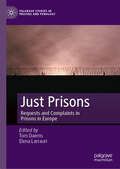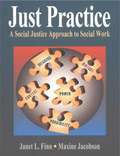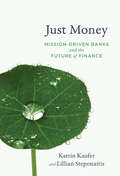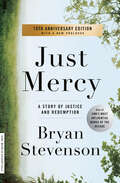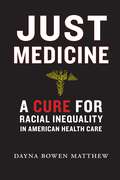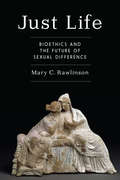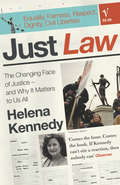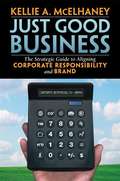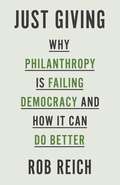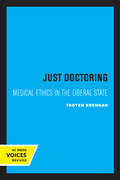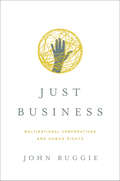- Table View
- List View
Just Prisons: Requests and Complaints in Prisons in Europe (Palgrave Studies in Prisons and Penology)
by Tom Daems Elena LarrauriThis edited book explores how requests and complaints by prisoners are being dealt with by prison governors/administrations or independent bodies (such as complaint commissions), in different parts of Europe. It asks who complains and why? How are complaints from prisoners being dealt with, from a legal and empirical point of view? How do procedures work and can they be considered effective? Should administrative procedures be exhausted before appealing to a judge? It explores whether such systems comply with international regulation, such as the European Prison Rules, the UN Mandela Rules or the case-law of the ECtHR. It speaks to academics, NGOs and lawyers with an interest in prison law, human rights bodies and prison monitoring bodies.
Just Price in the Markets: A History
by Charles R. GeisstA concise history of “just price,” from Aristotle to the present day The question of what constitutes a fair price has been at the center of market interactions since the time of Aristotle. Should a seller sell to the highest bidder, or is there some other standard, such as a morally defined price, to be applied? Charles R. Geisst traces the ways that philosophers, religious leaders, and economists have sought to answer that question, from antiquity through the modern era. Aristotle’s thinking on usury influenced the idea of pricing well into the Renaissance. In his view, money was barren and should not be used to beget more money. As trade became more extensive, the strictures placed on pricing by Aristotelian thinking began to fall away, replaced by Roman and common-law conceptions of value and interest. Geisst’s book follows the evolution of that thought—influenced along the way by figures such as Copernicus, Fibonacci, Adam Smith, Marx, Cassel, and Keynes—and charts parallel developments in European and Islamic notions of fair pricing. Today, pricing is seen as an economic inevitability, dictated by the laws of supply and demand. But this has not always been the case. As Geisst argues, the idea of a just price was once a moral concept, long before it was an economic one.
Just Practice: A Social Justice Approach to Social Work
by Janet L. Finn Maxine JacobsonSocial work in the 21st century calls for new ways of thinking and acting in order to address these challenges and realize our professional commitment to social justice.
Just Peace
by Mona FixdalDrawing on many of the wars and peaces of recent decades, this book offers a persuasive new perspective on postwar justice. In her analysis wars of succession, wars for territory, and the political institutions that precede and follow wars, Fixdal explores the outer limits of the idea that it is worth paying almost any price for peace.
Just One More Dance
by Thessie L.MitchellJust One More Dance is the author's story of how a tragic accident changed his life. When Thessie Mitchell jay walked across the street little did he know how that day would change his life forever. A car hit him and left him a quadriplegic. Thessie tells his life story from a hospital bed. He describes his years on the police force and the ups and downs of his professional and personal life.
Just Money: Mission-Driven Banks and the Future of Finance
by Katrin Kaufer Lillian SteponaitisHow to use finance as a tool to build a more equitable and sustainable society.Money defines our present and will shape our future. Every investment decision we make adds a chapter to the story of what our world will look like. Although the idea of mission-based finance has been around for decades, there is a gap between organizations' stated intention to "do good" and meaningful impact. Still, some are succeeding. In Just Money, Katrin Kaufer and Lillian Steponaitis take readers on a global tour of financial institutions that use finance as a force for good.
Just Mercy: A True Story of the Fight for Justice
by Bryan StevensonIn this young adult adaptation of the acclaimed bestselling Just Mercy, which the New York Times calls "as compelling as To Kill a Mockingbird, and in some ways more so," Bryan Stevenson delves deep into the broken U.S. justice system, detailing from his personal experience his many challenges and efforts as a lawyer and social advocate, especially on behalf of America's most rejected and marginalized people. <P><P>In this very personal work--proceeds of which will go to charity--Bryan Stevenson recounts many and varied stories of his work as a lawyer in the U.S. criminal justice system on behalf of those in society who have experienced some type of discrimination and/or have been wrongly accused of a crime and who deserve a powerful advocate and due justice under the law. <P><P>Through the Equal Justice Initiative (EJI), an organization Stevenson founded as a young lawyer and for which he currently serves as Executive Director, this important work continues. EJI strives to end mass incarceration and excessive punishment in the United States, working to protect basic human rights for the most vulnerable people in American society.
Just Mercy: A Story of Justice and Redemption (One World Essentials)
by Bryan Stevenson#1 NEW YORK TIMES BESTSELLER • NOW A MAJOR MOTION PICTURE STARRING MICHAEL B. JORDAN AND JAMIE FOXX • A powerful true story about the potential for mercy to redeem us, and a clarion call to fix our broken system of justice—from one of the most brilliant and influential lawyers of our time. &“[Bryan Stevenson&’s] dedication to fighting for justice and equality has inspired me and many others and made a lasting impact on our country.&”—John LegendNAMED ONE OF THE MOST INFLUENTIAL BOOKS OF THE DECADE BY CNN • Named One of the Best Books of the Year by The New York Times • The Washington Post • The Boston Globe • The Seattle Times • Esquire • Time Bryan Stevenson was a young lawyer when he founded the Equal Justice Initiative, a legal practice dedicated to defending those most desperate and in need: the poor, the wrongly condemned, and women and children trapped in the farthest reaches of our criminal justice system. One of his first cases was that of Walter McMillian, a young man who was sentenced to die for a notorious murder he insisted he didn&’t commit. The case drew Bryan into a tangle of conspiracy, political machination, and legal brinksmanship—and transformed his understanding of mercy and justice forever. Just Mercy is at once an unforgettable account of an idealistic, gifted young lawyer&’s coming of age, a moving window into the lives of those he has defended, and an inspiring argument for compassion in the pursuit of true justice.Winner of the Carnegie Medal for Excellence in Nonfiction • Winner of the NAACP Image Award for Nonfiction • Winner of a Books for a Better Life Award • Finalist for the Los Angeles Times Book Prize • Finalist for the Kirkus Reviews Prize • An American Library Association Notable Book&“Every bit as moving as To Kill a Mockingbird, and in some ways more so . . . a searing indictment of American criminal justice and a stirring testament to the salvation that fighting for the vulnerable sometimes yields.&”—David Cole, The New York Review of Books &“Searing, moving . . . Bryan Stevenson may, indeed, be America&’s Mandela.&”—Nicholas Kristof, The New York Times &“You don&’t have to read too long to start cheering for this man. . . . The message of this book . . . is that evil can be overcome, a difference can be made. Just Mercy will make you upset and it will make you hopeful.&”—Ted Conover, The New York Times Book Review &“Inspiring . . . a work of style, substance and clarity . . . Stevenson is not only a great lawyer, he&’s also a gifted writer and storyteller.&”—The Washington Post &“As deeply moving, poignant and powerful a book as has been, and maybe ever can be, written about the death penalty.&”—The Financial Times &“Brilliant.&”—The Philadelphia Inquirer
Just Medicine: A Cure for Racial Inequality in American Health Care
by Dayna Bowen MatthewOffers an innovative plan to eliminate inequalities in American health care and save the lives they endanger Over 84,000 black and brown lives are needlessly lost each year due to health disparities: the unfair, unjust, and avoidable differences between the quality and quantity of health care provided to Americans who are members of racial and ethnic minorities and care provided to whites. Health disparities have remained stubbornly entrenched in the American health care system—and in Just Medicine Dayna Bowen Matthew finds that they principally arise from unconscious racial and ethnic biases held by physicians, institutional providers, and their patients.Implicit bias is the single most important determinant of health and health care disparities. Because we have missed this fact, the money we spend on training providers to become culturally competent, expanding wellness education programs and community health centers, and even expanding access to health insurance will have only a modest effect on reducing health disparities. We will continue to utterly fail in the effort to eradicate health disparities unless we enact strong, evidence-based legal remedies that accurately address implicit and unintentional forms of discrimination, to replace the weak, tepid, and largely irrelevant legal remedies currently available.Our continued failure to fashion an effective response that purges the effects of implicit bias from American health care, Matthew argues, is unjust and morally untenable. In this book, she unites medical, neuroscience, psychology, and sociology research on implicit bias and health disparities with her own expertise in civil rights and constitutional law. In a time when the health of the entire nation is at risk, it is essential to confront the issues keeping the health care system from providing equal treatment to all.
Just Married
by Stephen MacedoThe institution of marriage stands at a critical juncture. As gay marriage equality gains acceptance in law and public opinion, questions abound regarding marriage's future. Will same-sex marriage lead to more radical marriage reform? Should it? Antonin Scalia and many others on the right warn of a slippery slope from same-sex marriage toward polygamy, adult incest, and the dissolution of marriage as we know it. Equally, many academics, activists, and intellectuals on the left contend that there is no place for monogamous marriage as a special status defined by law. Just Married demonstrates that both sides are wrong: the same principles of democratic justice that demand marriage equality for same-sex couples also lend support to monogamous marriage.Stephen Macedo displays the groundlessness of arguments against same-sex marriage and defends marriage as a public institution against those who would eliminate its special status or supplant it with private arrangements. Arguing that monogamy reflects and cultivates our most basic democratic values, Macedo opposes the legal recognition of polygamy, but agrees with progressives that public policies should do more to support nontraditional caring and caregiving relationships. Throughout, Macedo explores the meaning of contemporary marriage and the reasons for its fragility and its enduring significance. His defense of reformed marriage against slippery slope alarmists on the right, and radical critics of marriage on the left, vindicates the justice and common sense of the emerging consensus. Casting new light on today's debates over the future of marriage, Just Married lays the groundwork for a stronger institution.
Just Life: Bioethics and the Future of Sexual Difference
by Mary C. RawlinsonJust Life reorients ethics and politics around the generativity of mothers and daughters rather than the right to property and the sexual proprieties of the oedipal drama. Invoking two concrete universals—everyone is born of a woman and everyone needs to eat—Rawlinson rethinks labor and food as relationships that make ethical claims and sustain agency. Just Life counters the capitalization of bodies under biopower with the solidarity of sovereign bodies.
Just Leisure: Things That We Believe In
by Daniel L. Dustin Keri SchwabThis book is intended to deepen your understanding of social and environmental justice in the context of leisure. It will spur your curiosity and bring you to your learning edge -- the place where you come when you are a little anxious and uncomfortable and where you can either pull back into your comfort zone and stay with the familiar or lean into your discomfort, suspend your disbelief, and open yourself to the possibility of learning something new. This book features 19 thought-provoking chapters with discussion questions and syntheses contributed by authors from the United States, Canada, and Australia. Whether you come to this work through your concern for the environment or through your desire for greater social equity among people, you come to justice work because you recognise the need for it and believe you can make a difference.
Just Law
by Helena KennedyAcute, questioning, humane and passionately concerned for justice, Helena Kennedy is one of the most powerful voices in legal circles in Britain today. Here she roundly challenges the record of modern governments over the fundamental values of equality, fairness and respect for human dignity. She argues that in the last twenty years we have seen a steady erosion of civil liberties, culminating today in extraordinary legislation, which undermines long established freedoms. Are these moves a crude political response to demands for law and order? Or is the relationship between citizens and the state being covertly reframed and redefined?
Just Jones: Sometimes a Thing Is Impossible . . . Until It Is Actually Done (A Noticer Book)
by Andy AndrewsFrom New York Times bestselling author Andy Andrews comes the return of one of our favorite fictional characters: Jones, the noticer. A mysterious elderly man with white hair and endless wisdom who always appears to show up exactly when he&’s needed most.At 3:29 a.m. on May 22, a telephone rings in Orange Beach, Alabama. Breaking the sleepy silence inside the bedroom of New York Times bestselling author Andy Andrews, a hastily whispered message heralds the news that Andy has been waiting on for seven years: Jones is back in town. Apparently, however, he is also in jail. The old man is tight-lipped about the circumstances surrounding his brief incarceration. After arriving to bail him out, Andy is shocked to discover that his trusted friend has already opened an unusual business in one of the resort town&’s most high-profile shopping districts. Jones&’s Five & Dime seems to always have exactly what visitors are looking for, even as their fate steadily becomes entwined with Jones&’s. As the town moves from spring to summer, a practical joker is becoming bolder and more inventive with every prank that is pulled. Could Jones be behind some of it? Why? And what will happen if he is? What&’s the truth about that four-hundred-pound table in his Five & Dime? What compels certain people to gather around it every morning? And why does it look as if every person Jones meets has a secret they will reveal only to him? With rare insight, Andy and Jones take us on a journey that proves the importance of perspective, the power of connection, and the ability we all have to make the impossible come true.
Just Housing: The Moral Foundations of American Housing Policy (Urban and Industrial Environments)
by Casey J. DawkinsA new conception of housing justice grounded in moral principles that appeal to the home&’s special connection to American life.In response to the twin crises of homelessness and housing insecurity, an emerging &“housing justice&” coalition argues that America&’s apparent inability to provide decent housing for all is a moral failing. Yet if housing is a right, as housing justice advocates contend, what is the content of that right? In a wide-ranging examination of these issues, Casey Dawkins chronicles the concept of housing justice, investigates the moral foundations of the US housing reform tradition, and proposes a new conception of housing justice that is grounded in moral principles that appeal to the home&’s special connection to American life. Dawkins examines the conceptual foundations of justice and explores the social meaning of the American home. He chronicles the evolution of American housing reform, showing how housing policy was pieced together from layers of housing and land-use policies enacted over time, and investigates the endurance—from the founding of the republic through the postwar era—of the owned single-family home as the embodiment of national values. Finally, Dawkins considers housing justice, drawing on elements of liberalism, republicanism, progressivism, and pragmatism to defend a right-based conception of housing justice grounded in the ideal of civil equality. Arguing that any defense of private property must appeal to the interests of those whose tenure is made insecure by the institution of private property, he proposes a &“secure tenure&” property regime and a &“negative housing tax&” that would fund a guaranteed housing allowance.
Just Health: Treating Structural Racism to Heal America
by Dayna Bowen MatthewChoice Outstanding Academic Title 2023The author of the bestselling Just Medicine reveals how racial inequality undermines public health and how we can change itWith the rise of the Movement for Black Lives and the feverish calls for Medicare for All, the public spotlight on racial inequality and access to healthcare has never been brighter. The rise of COVID-19 and its disproportionate effects on people of color has especially made clear how the color of one’s skin is directly related to the quality of care (or lack thereof) a person receives, and the disastrous health outcomes Americans suffer as a result of racism and an unjust healthcare system.Timely and accessible, Just Health examines how deep structural racism embedded in the fabric of American society leads to worse health outcomes and lower life expectancy for people of color. By presenting evidence of discrimination in housing, education, employment, and the criminal justice system, Dayna Bowen Matthew shows how racial inequality pervades American society and the multitude of ways that this undermines the health of minority populations. The author provides a clear path forward for overcoming these massive barriers to health and ensuring that everyone has an equal opportunity to be healthy. She encourages health providers to take a leading role in the fight to dismantle the structural inequities their patients face. A compelling and essential read, Just Health helps us to understand how racial inequality damages the health of our minority communities and explains what we can do to fight back.
Just Harvest: The Story of How Black Farmers Won the Largest Civil Rights Case against the U.S. Government
by Greg FrancisWhen a class-action lawsuit against the US government results in a billion dollar settlement for the aggrieved parties, you&’d expect the story to be headline news . . .to be posted on social media everywhere . . . to be adapted to film or even to a popular legal procedural series on TV . . .So why then have so many people never heard of Pigford vs. Glickman? Or the follow-up lawsuit, Pigford II? Or the Black Farmers Case, as the pair of these legal actions is often called? Could it be that the heart-wrenching story of Black farmers in America, and the monumental legal case that brought long-sought justice to them, is rarely told because it reflects so poorly on the US and its treatment of those whose ancestors helped make the nation an agricultural giant in the first place? Whatever the reason, the time to tell the full story has come and the person to share the gripping details is Greg Francis, one of the lead counsels in the historic case that finally helped Black farmers achieve equity. In Just Harvest, Francis narrates the dramatic twists and turns of the legal battle fought and won, and evidences the many years of ingrained discrimination and racism that preceded it. Awareness of this story makes us all witnesses to the history still unfolding— and while parts of what is recounted herein will enrage you, the hope is that this book will also inspire, inform, and motivate you to join the continuing fight for the rights of all Black farmers now and in the future.
Just Good Business: The Strategic Guide to Aligning Corporate Responsibility and Brand
by Kellie McelhaneyEvery major company has a corporate strategy based on business objectives and competencies of the firm. Most major companies claim to have a corporate social responsibility strategy, most of which are not linked to business objectives of the firm.
Just Giving: Why Philanthropy Is Failing Democracy and How It Can Do Better
by Rob ReichThe troubling ethics and politics of philanthropyIs philanthropy, by its very nature, a threat to today’s democracy? Though we may laud wealthy individuals who give away their money for society’s benefit, Just Giving shows how such generosity not only isn’t the unassailable good we think it to be but might also undermine democratic values and set back aspirations of justice. Big philanthropy is often an exercise of power, the conversion of private assets into public influence. And it is a form of power that is largely unaccountable, often perpetual, and lavishly tax-advantaged. The affluent—and their foundations—reap vast benefits even as they influence policy without accountability. And small philanthropy, or ordinary charitable giving, can be problematic as well. Charity, it turns out, does surprisingly little to provide for those in need and sometimes worsens inequality.These outcomes are shaped by the policies that define and structure philanthropy. When, how much, and to whom people give is influenced by laws governing everything from the creation of foundations and nonprofits to generous tax exemptions for donations of money and property. Rob Reich asks: What attitude and what policies should democracies have concerning individuals who give money away for public purposes? Philanthropy currently fails democracy in many ways, but Reich argues that it can be redeemed. Differentiating between individual philanthropy and private foundations, the aims of mass giving should be the decentralization of power in the production of public goods, such as the arts, education, and science. For foundations, the goal should be what Reich terms “discovery,” or long-time-horizon innovations that enhance democratic experimentalism. Philanthropy, when properly structured, can play a crucial role in supporting a strong liberal democracy.Just Giving investigates the ethical and political dimensions of philanthropy and considers how giving might better support democratic values and promote justice.
Just Fodder: The Ethics of Feeding Animals
by Josh MilburnAnimal lovers who feed meat to other animals are faced with a paradox: perhaps fewer animals would be harmed if they stopped feeding the ones they love. Animal diets do not raise problems merely for individuals. To address environmental crises, health threats, and harm to animals, we must change our food systems and practices. And in these systems, animals, too, are eaters.Moving beyond what humans should eat and whether to count animals as food, Just Fodder answers ethical and political questions arising from thinking about animals as eaters. Josh Milburn begins with practical dilemmas about feeding the animals closest to us, our pets or animal companions. The questions grow more complicated as he considers relationships with more distance – questions about whether and how to feed garden birds, farmland animals who would eat our crops, and wild animals. Milburn evaluates the nature and circumstances of our relationships with animals to generate a novel theory of animal rights.Looking past arguments about what we can and cannot do to other beings, Just Fodder asks what we can, should, and must do for them, laying out a fuller range of our ethical obligations to other animals.
Just Energy Transitions and Coal Bed Methane: The case of Indonesia (Energy, Climate and the Environment)
by Theresia Betty SumarnoThis book discusses how Coal Bed Methane (CBM) could help the acceleration of the energy transition in a ‘just’ way in Indonesia, due to the country's potential CBM reserves (and current dependence on climate damaging coal). Developing countries face multiple challenges in achieving their energy transitions. CBM in Indonesia could potentially be a catalyst for energy transition and subsequently improve access to energy. However, CBM faces numerous challenges and although Indonesia first developed its domestic CBM sector over more than a decade ago, they are still to implement this successfully. This book exposes the challenges and opportunities of CBM, exploring what lessons other countries could learn from Indonesia to improve the industry with a view to achieving energy transition and climate change targets. This book will be an invaluable reference for researchers and practitioners working in this field.
Just Doctoring: Medical Ethics in the Liberal State
by Troyen A. BrennanThis title is part of UC Press's Voices Revived program, which commemorates University of California Press’s mission to seek out and cultivate the brightest minds and give them voice, reach, and impact. Drawing on a backlist dating to 1893, Voices Revived makes high-quality, peer-reviewed scholarship accessible once again using print-on-demand technology. This title was originally published in 1991.
Just Culture and the Criminalisation of Air Accidents
by Simon DanielsJust Culture and the Criminalisation of Air Accidents equips the reader with the tools to understand the meaning of criminalisation in the civil aviation industry. It enables them to resolve problems that arise in risk management within the context of their professional employment.By examining the priorities of pilots, air traffic controllers and prosecutors, this book analyses the anatomy of criminalisation in civil aviation and works towards constructing solutions that protect the professionals’ human rights and the Just Culture concept within the framework of criminal law and practice. It covers the duty of an air traffic controller to take the standard of care to guard against acts or omissions which might cause loss and give rise to a claim in negligence. The book illustrates the critical features discussed with numerous case studies from States and jurisdictions around the world.The book will benefit airline operators, pilots, air traffic controllers or managers, and aviation business managers.
Just Business: Multinational Corporations and Human Rights (Norton Global Ethics Series)
by John Gerard Ruggie"A true master class in the art of making the impossible possible." --Paul Polman One of the most vexing human rights issues of our time has been how to protect the rights of individuals and communities worldwide in an age of globalization and multinational business. Indeed, from Indonesian sweatshops to oil-based violence in Nigeria, the challenges of regulating harmful corporate practices in some of the world's most difficult regions long seemed insurmountable. Human rights groups and businesses were locked in a stalemate, unable to find common ground. In 2005, the United Nations appointed John Gerard Ruggie to the modest task of clarifying the main issues. Six years later, he had accomplished much more than that. Ruggie had developed his now-famous "Guiding Principles on Business and Human Rights," which provided a road map for ensuring responsible global corporate practices. The principles were unanimously endorsed by the UN and embraced and implemented by other international bodies, businesses, governments, workers' organizations, and human rights groups, keying a revolution in corporate social responsibility. Just Business tells the powerful story of how these landmark "Ruggie Rules" came to exist. Ruggie demonstrates how, to solve a seemingly unsolvable problem, he had to abandon many widespread and long-held understandings about the relationships between businesses, governments, rights, and law, and develop fresh ways of viewing the issues. He also takes us through the journey of assembling the right type of team, of witnessing the severity of the problem firsthand, and of pressing through the many obstacles such a daunting endeavor faced. Just Business is an illuminating inside look at one of the most important human rights developments of recent times. It is also an invaluable book for anyone wanting to learn how to navigate the tricky processes of global problem-solving and consensus-building and how to tackle big issues with ambition, pragmatism, perseverance, and creativity.
Just Business: Christian Ethics for the Marketplace
by Alexander Hill"An ethical man is a Christian holding four aces." So said Mark Twain. But practicing Christians, at least, want to be ethical in all areas of life and work--not just when they are holding four aces. To those faced with the many questions and quandaries of doing business with integrity, Alexander Hill offers a place to begin. Alexander Hill carefully explores the foundational Christian concepts of holiness, justice and love. These keys to God's character, he argues, are also the keys to Christian business ethics. Hill then shows how some common responses to business ethics fall short of a fully Christian response. Finally, he turns to penetrating case studies on such pressing topics as employer-employee relations, discrimination and affirmative action, and environmental damage. This is an excellent introduction to business ethics for students and a bracing refresher for men and women already in the marketplace.
